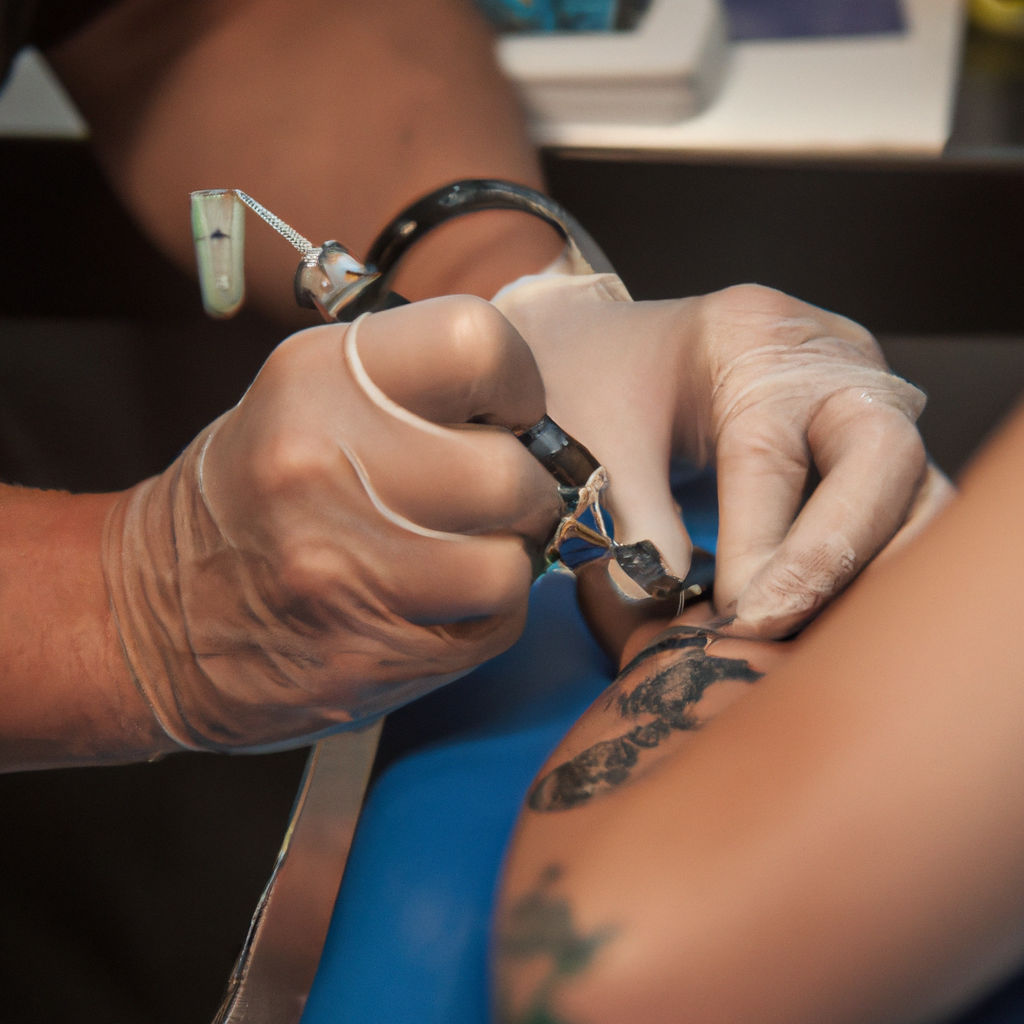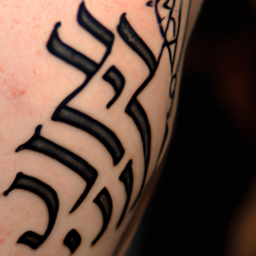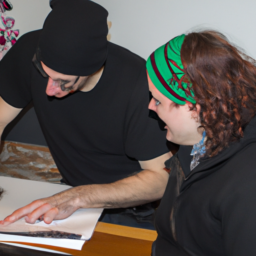“Safety and Care Tips for Your New Hebrew Tattoo: Ensuring Longevity”
Hebrew tattoos have seen a surge in popularity in recent years. As more and more people learn about the rich symbolism and deep meaning found in Hebrew script, an increasing number are choosing to get these unique and distinctive tattoos. Hebrew tattoo art combines aesthetic beauty and deeply spiritual messages. Whether it’s a famous quote, name, or an abstract concept, each tattoo in Hebrew script carries a unique story, making it an attractive form of expression.
However, getting a tattoo isn’t a simple task and requires a lot of thought, hence it is paramount to ensure care and safety measures are put into place. As with any tattoo, specific measures can help maintain the longevity of the tattoo, ensuring vibrancy and clarity over time.
The Cultural Significance and Implications of Hebrew Tattoos
Long before they graced the skin of modern tattoo enthusiasts, Hebrew tattoos have held a rich cultural significance. Stemming from Judaism’s deep history, these tattoos often incorporate powerful symbols, historic moments, or meaningful scriptures central to the religion, thus carrying profound historical and cultural weight.
However, it’s essential to bear in mind the implications of getting a tattoo in a language different from your own. While the aesthetic appeal of Hebrew script is undeniable, it’s crucial to understand the meaning behind the symbols or words chosen. As Hebrew is a complex and ancient language, you would do well not to take the symbolism lightly or perhaps choose a design that could potentially be offensive. This underlines the importance of proper research and understanding before opting for a Hebrew tattoo.
As you consider delving into the rich tapestry of Hebrew tattoo artistry, do so with respect for the language, culture, and the necessary care required to maintain the longevity of your tattoo. This can create a uniquely beautiful expression of individuality, steeped in rich historical and cultural significance.
Choosing a Reputable Tattoo Artist
Getting a tattoo, especially in a language that differs from your own, requires the services of a competent, skilled, and licensed professional. Your tattoo is a long term investment, one that will become a part of your body and personality. Therefore, choosing a reputable tattoo artist is not just important, it’s crucial.
Without a capable artist, your tattoo vision may not be realized as you had hoped. Furthermore, a poorly done tattoo can lead to issues such as infection, disease transmission, and even scarring. Therefore, it’s imperative to do extensive research on different tattoo artists, checking their portfolio, license, reviews, and sanitation procedures.
Even more vital, when choosing a tattoo in Hebrew, is to find an artist who is well versed with the language’s script. Hebrew, like many other languages, has its unique characters, writing style, and alphabet structure. A slight mistake in the design could lead to the changing or misunderstanding of the tattoo’s meaning. Thus, make sure your chosen tattoo artist understands Hebrew and its intricacies to avoid any future blunders or regrets.
Understanding the Meaning of Your Hebrew Tattoo
Hebrew Tattoos, being rich in symbolism and history, have profound meanings attached to them. Hence, understanding the meaning of your tattoo correctly is paramount before getting it etched forever on your skin.
Misinterpretation or mistranslation of the chosen phrase or word could lead to embarrassing, and in some cases, disrespectful blunders. Therefore, it is strongly recommended to make use of reliable language translators or individuals knowledgeable in Hebrew for accurate translations.
When deciding upon the phrase or word for your Hebrew tattoo, it’s beneficial to ask yourself why you’re drawn to that particular element. Attempt to create a personal connection with your chosen tattoo. Remember, the more meaning your tattoo holds for you, the more you will cherish it.
Remember: tattoos are not just for aesthetic pleasure; they narrate stories, hold memories and express identities. Hence, it’s essential that the script inked on your body resonates deeply with you, and conveys the intended meaning accurately.
In conclusion, investing time and thought into choosing a reputable tattoo artist and understanding your Hebrew tattoo’s meaning can prevents regrets or embarrassing situations later. These steps can enhance your experience, making your tattoo journey more fulfilling and enjoyable.
Make it not just a tattoo, but a piece of art that tells your story.

Deciding on the Placement of Your Hebrew Tattoo
Choosing the right spot for your Hebrew tattoo is vital for its longevity but it’s also a matter of personal preference and lifestyle. Some people prefer hidden places, while others want their body art to be visible. However, do remember that the skin on some parts of your body may drive quicker fading than others.
Palms, lips or the soles of your feet have a high cell turnover rate making these areas unsuitable for keeping your tattoo looking fresh. To maximize the life of your Hebrew tattoo, consider placing it on parts of your body such as the back, chest, forearm, or thigh. These tend to age better and provide a good canvas for intricate Hebrew calligraphy.
Post-Tattoo Care: Your Road to Healing and Longevity
Taking care of your new Hebrew tattoo is essential right from the moment the needle lifts off your skin. Firstly, avoid direct sunlight on the tattoo and refrain from swimming or soaking it in water. Then, cleaning the tattoo properly contributes significantly towards its longevity.
Generally, most tattoo artists recommend cleaning the tattoo three to five times a day for the initial few days. This process involves washing it with a mild, unscented soap and then patting it dry.
After this, applying a thin layer of a specially designed tattoo lotion or ointment is a good idea. Some people may prefer a petroleum-based product, but others might opt for a more natural alternative. It is crucial to always use a product recommended by your tattoo artist or a professional.
In those first few weeks, the tattooed area will likely scab over as part of the healing process. It’s essential to not pick or scratch at it, even though it might itch. Doing so can lead to possible infection or even distort the design of your Hebrew tattoo.
Remember, a little bit of aftercare can go a long way in keeping your tattoo looking vibrant and meaningful for years to come! SEO keywords: Hebrew tattoo placement, post-tattoo care, tattoo healing, long-lasting tattoos.
Understanding the Health Implications of Tattoos
One crucial step in planning for a Hebrew tattoo—or any tattoo, for that matter, is understanding the potential health risks involved. Every body modification carries a degree of risk and tattoos are no different. Unforeseen complications might arise during or after the procedure that can lead to health issues, so it’s essential to be vigilant about these possibilities.
The use of unsterilized tools can result in infections that may culminate in serious health problems, including potential life-threatening diseases like Hepatitis B, Hepatitis C, Tetanus, or even HIV. It is therefore crucial you ensure that your chosen tattoo artist uses sterilized tools and maintains a clean workspace to mitigate these risks. Allergic reactions to tattoo ink are also a possibility, though they rarely occur.
In addition, skin disorders such as granulomas and keloids may develop as a result of the tattooing process. Granulomas are small nodules that form around foreign material, like tattoo pigment, while keloids are raised overgrowths of scar tissue that can form around the tattoo.
Vigilance Post-Tattoo
Now that you have your Hebrew tattoo, you’ll need to stay vigilant and regularly report on your tattoo’s condition. Familiarise yourself with common symptoms that indicate something might be amiss. If you experience persistent pain, swelling, redness, or notice any discharge, you should immediately seek medical attention to avoid any further complications. It could be an indication of an infection that needs to be treated promptly.
Moreover, sun exposure can wreak havoc on a fresh tattoo. Sunburns can not only lead to premature fading but also increase the risk of skin cancer. To prevent damaging UV exposure, it’s recommended that you keep your new tattoo covered from the sun for at least the first few weeks.
By understanding these health implications, you can significantly reduce your risk for complications and ensure the longevity and brightness of your new Hebrew tattoo. Always remember, if you spot any health warning signs related to your tattoo, don’t hesitate to seek professional medical advice immediately.

Considering the Future: Tattoo Modification and Removal
One critical aspect to dwell upon before committing to a permanent Hebrew tattoo is the possibility of modification or complete removal in the future. Tattoo recognition and acceptance diversify greatly among diverse social groups, eras, and personal circumstances. Therefore, contemplating possible future scenarios where you might want to modify or remove your tattoo is prudent.
Understanding Tattoo Modifications
Tattoo modifications functions as a reform or upgrade of an existing tattoo. Sometimes, this involves transforming the original design to better reflect changes in the individual’s personality, beliefs or aesthetics. In reference to Hebrew tattoos, you may consider modifying the original script or adding to the existing design to encapsulate a more in-depth or altered life perception. However, remember that the modifications depend heavily on the original tattoo design, placement, and size.
Tattoo Removals: Think Before You Ink
Removal is a more complex process, requiring more commitment. It involves laser procedures that break down the tattoo ink, allowing your body to naturally remove it. Unfortunately, it can also carry potential risks including scarring, skin color changes, and incomplete removal. Furthermore, the success of the removal depends on several factors, for instance, the age, size, color of the tattoo, and most notably, the individual’s skin type.
It’s crucial to highlight that tattoo removal is also a costly and time-consuming process often requiring numerous sessions for complete clearing. Therefore, the gravity of this decision cannot be overstated. An inked Hebrew symbol should carry not only aesthetic value but also a profound, timeless significance for the carrier.
Keep in mind that tattoos are permanent additions to your body and should only be inked after serious consideration. Whether your chosen tattoo is a Hebrew script or any other design, it’s always advisable to consult with experienced professionals and take into account your future personal, lifestyle, and professional prospects.

To conclude, it’s crucial to give properly think through before embarking on the journey of a Hebrew tattoo. Not only should you dedicate time to understand the full meaning and implications of your chosen design, but also exercise the utmost caution and diligence in selecting a professional and proficient tattoo artist. Familiarity with Hebrew script is key to ensuring accurate translation and preventing any potential embarrassment stemming from misinterpretations.
The longevity and health of your tattoo significantly depend on the care you provide it, both immediately after getting inked and in the long term. Whilst immediate aftercare focuses on thorough cleaning and protection of the tattoo, long-term maintenance involves regular moisturizing and safeguarding against sun damage. It’s essential for maintaining the vibrancy of the ink and preventing the tattoo from fading over time.
As with any form of body modifications, Hebrew tattoos have potential health implications. It’s important to be vigilant about any adverse reactions and seek medical attention if you spot alarming signs post-tattooing.
And though you may be convinced about getting a tattoo at a certain time, your preferences and perspectives may change over time. Hence, it’s constructive to consider the possibilities for future modification or removal of the tattoo. Be aware, though, that tattoo removal can be challenging, with potential for scarring and skin discoloration.
In the final analysis, a Hebrew tattoo can be a powerful symbol of personal meaning and cultural appreciation, provided you approach it with necessary caution, knowledge, and responsibility. Remember, tattoos are a life-long commitment and deserve meticulous planning and preparation. So, familiarize yourself with the aesthetics, protocol, and implications before you take a plunge into this unique form of self-expression.
While the trend of Hebrew tattoos continues to rise, it’s paramount you make informed decisions while expressing your identity or appreciation for a culture different from your own. Thereby, ensuring a beautiful and richly symbolic tattoo that remains a cherished asset and mark of pride for years to come.

